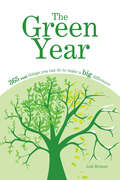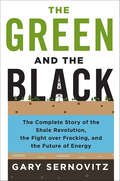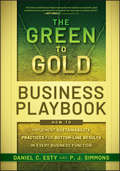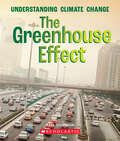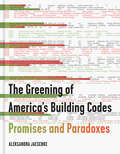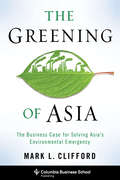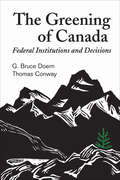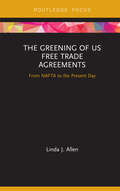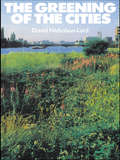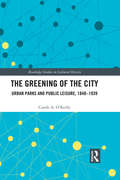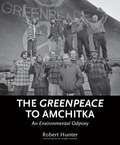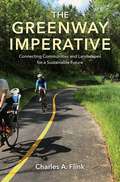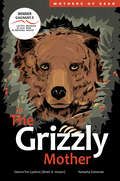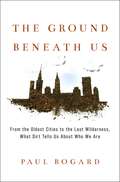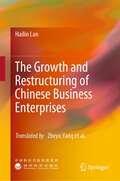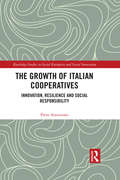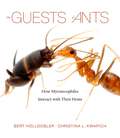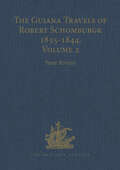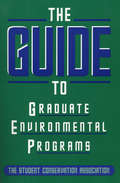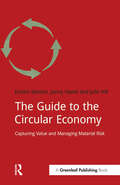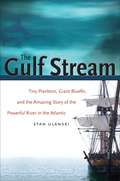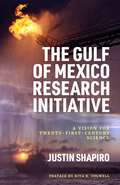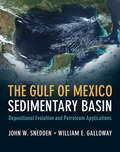- Table View
- List View
The Green Year: 365 Small Things You Can Do to Make a Big Difference
by Jodi HelmerGo green one day at a time. Do something every day. Most of us want to do the right thing for the environment, but making the commitment to change our fast-paced, convenience-oriented lifestyles can be more than a little daunting. What&’s the answer? Take that giant commitment and cut it up into 365 little commitments that get met one day at a time. The Green Year does just that. More than a calendar, it offers simple, practical, affordable, and engaging activities that make going green a blessing rather than a burden. In addition to these easy green suggestions, readers will find in The Green Year: • The &“why&” behind each activity—what makes it good for the environment and the reader? • A quick &“how-to&” for any activity that requires it • Room for readers to write in their own creative alternatives • Helpful illustrations
The Green and the Black: The Complete Story of the Shale Revolution, the Fight over Fracking, and the Future of Energy
by Gary SernovitzGary Sernovitz leads a double life. A typical New York liberal, he is also an oilman - a fact his left-leaning friends let slide until the word "fracking" entered popular parlance. "How can you frack?" they suddenly demanded, aghast. But for Sernovitz, the real question is, "What happens if we don't?"Fracking has become a four-letter word to environmentalists. But most people don't know what it means. In his fast-paced, funny, and lively book, Sernovitz explains the reality of fracking: what it is, how it can be made safer, and how the oil business works. He also tells the bigger story. Fracking was just one part of a shale revolution that shocked our assumptions about fueling America's future. The revolution has transformed the world with consequences for the oil industry, investors, environmentalists, political leaders, and anyone who lives in areas shaped by the shales, uses fossil fuels, or cares about the climate - in short, everyone. Thanks to American engineers' oilfield innovations, the United States is leading the world in reducing carbon emissions, has sparked a potential manufacturing renaissance, and may soon eliminate its dependence on foreign energy. Once again the largest oil and gas producer in the world, America has altered its balance of power with Russia and the Middle East.Yet the shale revolution has also caused local disruptions and pollution. It has prolonged the world's use of fossil fuels. Is there any way to reconcile the costs with the benefits of fracking?To do so, we must start by understanding fracking and the shale revolution in their totality. The Green and the Black bridges the gap in America's energy education. With an insider's firsthand knowledge and unprecedented clarity, Sernovitz introduces readers to the shales - a history-upturning "Internet of oil" - tells the stories of the shale revolution's essential characters, and addresses all the central controversies. To capture the economic, political, and environmental prizes, we need to adopt a balanced, informed perspective. We need to take the green with the black. Where we go from there is up to us.
The Green to Gold Business Playbook: How to Implement Sustainability Practices for Bottom-Line Results in Every Business Function
by Daniel C. Esty P. J. Simmons"Implement the green strategies outlined in Dan Esty's and Andrew Winston's bestseller Green to Gold"Hard-nosed business advice for gaining competitive advantage through sustainability action in buildings and operations, information technology, product design, sourcing, manufacturing, logistics and transportation, marketing, accounting, and other key business functionsWhether you are a climate change skeptic or an environmentalist, sustainability issues cannot be ignored in today's corporate world. With rising energy and natural resource costs, intensified regulations, investor pressures, and a growing demand for environmentally friendly products, sustainability is no longer an option--it's a business imperative.Unlike many green business books, the Playbook skips the environmental ideology and deals exclusively with tools and strategies that have been shown to cut costs, reduce risks, drive revenues, and build brand identity.Builds on Dan Esty and Andrew Winston's prizewinning Green to Gold, which has become a business classic and a staple of management training across the world.Shows in detail how each business function or department can achieve an eco-advantage over the competitionOffers frameworks, checklists, and action plans applicable to any business-big or small, in manufacturing or servicesThe Green to Gold Business Playbook gives you the tools to make green work-and work profitably-for your business.
The Greenhouse Effect (A True Book (Relaunch))
by Mara GrunbaumWhat controls Earth's temperature? How do the changes happening now compare to those that have happened in the past? This book lays out how the makeup of Earth's atmosphere can affect everything living beneath it, and how human activities - from cutting down trees to burning fossil fuels - are changing the climate worldwide.Glaciers are melting. Summers are heating up. Sea levels are on the rise. Climate change is affecting every corner of our planet - and it's the subject of a lot of concern, activism, and debate. STEM meets current events in this new A True Book set that offers readers the chance to learn about the causes and effects of climate change, as well as how people around the world are reacting to it. Students will read about the history and scope of the problem, analyze the same kinds of evidence that scientists do, and come away with tools that will help them respond to this pressing global issue.This series covers Next Generation Science Standards core ideas including Weather and Climate, Human Impacts on Earth Systems, Conservation of Energy and Energy Transfer, and Biodiversity and Humans.
The Greening of America's Building Codes: Promises and Paradoxes
by Aleksandra JaeschkeEnvironmental disasters and severe weather due to climate change, both triggered by human actions, have had an increasingly direct impact on our homes. But the way in which America builds its homes is part of the problem. This deeply researched history of sustainable design standards in building codes explores how public policy, standard-setting trade associations, and financial incentives influence the ways in which the construction of our homes impacts the environment.The Greening of America's Building Codes investigates the regulations and economic incentives meant to control the environmental impact of contemporary construction practices as it analyzes the history of residential building codes. The book exposes how the socioeconomic and political forces that influenced early building code development continue to define the character of current building codes and, by extension, determine how we regulate environmental impact and define sustainability today.More relevant than ever, The Greening of America's Building Codes is a valuable tool for architects, architecture students, builders, real estate developers, and homeowners who want to understand how public policy and their own day-to-day decisions impact the environment.
The Greening of Asia
by Mark L. CliffordOne of Asia's best-respected writers on business and economy, Hong Kong-based author Mark L. Clifford provides a behind-the-scenes look at what companies in China, India, Japan, Korea, the Philippines, South Korea, Singapore, and Thailand are doing to build businesses that will lessen the environmental impact of Asia's extraordinary economic growth. Dirty air, foul water, and hellishly overcrowded cities are threatening to choke the region's impressive prosperity. Recognizing a business opportunity in solving social problems, Asian businesses have developed innovative responses to the region's environmental crises.From solar and wind power technologies to green buildings, electric cars, water services, and sustainable tropical forestry, Asian corporations are upending old business models in their home countries and throughout the world. Companies have the money, the technology, and the people to act -- yet, as Clifford emphasizes, support from the government (in the form of more effective, market-friendly policies) and the engagement of civil society are crucial for a region-wide shift to greener business practices. Clifford paints detailed profiles of what some of these companies are doing and includes a unique appendix that encapsulates the environmental business practices of more than fifty companies mentioned in the book.
The Greening of Asia: The Business Case for Solving Asia's Environmental Emergency (Columbia Business School Publishing Ser.)
by Mark CliffordOne of Asia's best-respected writers on business and economy, Hong Kong-based author Mark L. Clifford provides a behind-the-scenes look at what companies in China, India, Japan, Korea, the Philippines, Indonesia, Hong Kong, Singapore, and Thailand are doing to build businesses that will lessen the environmental impact of Asia's extraordinary economic growth. Dirty air, foul water, and hellishly overcrowded cities are threatening to choke the region's impressive prosperity. Recognizing a business opportunity in solving social problems, Asian businesses have developed innovative responses to the region's environmental crises. From solar and wind power technologies to green buildings, electric cars, water services, and sustainable tropical forestry, Asian corporations are upending old business models in their home countries and throughout the world. Companies have the money, the technology, and the people to act—yet, as Clifford emphasizes, support from the government (in the form of more effective, market-friendly policies) and the engagement of civil society are crucial for a region-wide shift to greener business practices. Clifford paints detailed profiles of what some of these companies are doing and includes a unique appendix that encapsulates the environmental business practices of more than fifty companies mentioned in the book.
The Greening of Canada: Federal Institutions and Decisions
by G. Bruce Doern Thomas ConwayEnvironmental matters have become increasingly important in Canadian and world policy agendas. In this study, G. Bruce Doern and Thomas Conway trace the development of Canadian environment policy, giving an in-depth account of twenty years of environmental politics, politicians, institutions, and decisions as seen through the evolution of Ottawa's policy agency, Environment Canada. The Greening of Canada is an extensively researched look at the entire period from the early 1970s to the present and is the most complete and integrated analysis yet of federal environmental institutions and key decisions. From Great Lakes pollution to the Green Plan, from the Stockholm Conference to the post–Rio Earth Summit era, the authors deal with both domestic and international events and influences on Ottawa's often abortive efforts to entrench a green agenda into national politics. The book explores the crucial relationships of institutional and political power, directing attention at the DOE and its parade of ministers, intra-cabinet battles, federal-provincial relations, business relations and public opinion, and international and Canada–U.S. relations. It also examines important topics from acid-rain policy to the politics of establishing national parks, and from the Green Plan to the realities of environmental enforcement. Employing a framework cast as the 'double dynamic' of environmental policy making, the authors show the growing struggle between the management of power among key institutions and the need to accommodate a biophysical realm characterized by increased uncertainty as well as scientific and technological controversy.
The Greening of US Free Trade Agreements: From NAFTA to the Present Day (Routledge Focus on Environment and Sustainability)
by Linda AllenThis book provides an up-to-date critical analysis of the integration of environmental policies into US free trade agreements. The work focuses on the evolution of the design of environmental policies and analyzes their effectiveness. Starting with the North American Free Trade Agreement (NAFTA) leading to the Trans-Pacific Partnership (TPP), the book examines the history of policy integration. In doing so, it provides an overview of the major trade-related environmental policies and presents empirical research on their effectiveness, a discussion of the continued demand for policy integration in light of the effectiveness, and recommendations for addressing shortcomings. The main objective of the book is to inform the ongoing policy debate over integration of environmental policies into trade agreements. The current renegotiation of NAFTA provides an opportune time for undertaking this critical review of trade-related environmental policies. As our understanding and knowledge of the environmental policies associated with US trade agreements, in particular for NAFTA, has grown significantly over the past twenty-five years, this book provides a timely and critical update for this policy debate. Students and scholars of environmental law, trade and economics, and specifically US trade, environmental policy and law will find this book of great interest.
The Greening of the Cities
by David Nicholson-LordFirst Published in 2004. Routledge is an imprint of Taylor & Francis, an informa company.
The Greening of the City: Urban Parks and Public Leisure, 1840-1939 (Routledge Studies in Cultural History #73)
by Carole A. O'ReillyUrban parks are a much-loved feature of the city environment. However, our knowledge of the true scale of their impact remains uneven. Much work has been done on their origins and design features, but this book aims to extend this beyond the nineteenth century, examining the fuller flowering of these valuable spaces in the early decades of the twentieth century. Encompassing themes such as social and political usage, parks as employers and the dangers posed by such freely accessible spaces, the book examines a range of parks in cities such as Manchester, Salford, Liverpool, Leeds, Preston, Hull and Cardiff and challenges the prevailing myths about their meaning for their users. This study's timeframe spans almost 100 years of unprecedented social, cultural, political and economic changes and allows for the consideration of the expansion and commercialisation of leisure opportunities for the public. Urban parks played a significant role in this — the book places parks firmly in the context of the evolving city and examines the importance of green space to the urban citizen during this most fascinating of historical periods.
The Greenpeace to Amchitka
by Robert Keziere Robert HunterGreenpeace is known around the world for its activism and education surrounding environmental and biodiversity issues. With a presence in more than 40 countries across Europe, the Americas, Asia and the Pacific, Greenpeace is undoubtedly a dominant force in the realm of environmental activism.This is the story of how Greenpeace came to be.In September 1971, a small group of activists boarded a small fishing boat in Vancouver, Canada, and headed north towards Amchitka, a tiny island west of Alaska in the Aleutian Islands, where the US government was conducting underground nuclear tests.At that time, protests against nuclear testing were not common, yet the US tests raised genuine concerns: Amchitka is not only the last refuge for endangered wildlife, but is also located in a geologically unstable region, one of the most earthquake-prone areas in the world. The threat of a nuclear-triggered earthquake or tsunami was real.Among the people sardined in the fishing boat were Robert Hunter and Robert Keziere.The boat, named the Greenpeace by the small group of men aboard, raced against time as it crashed through the Gulf of Alaska, braving the oncoming winter storms. Three weeks was all they had to reach Amchitka in an attempt to halt the nuclear test. Ultimately, the voyage--beset by bad weather, interpersonal tensions and conflicts with US officials--was doomed. And yet the legacy of that journey lives on.In this visceral memoir, based on a manuscript originally written over 30 years ago, Robert Hunter vividly depicts the peculiar odyssey that led to the formation of the most powerful environmental organization in the world.Features 40 black and white photographs taken during the voyage by Robert Keziere.
The Greenway Imperative: Connecting Communities and Landscapes for a Sustainable Future
by Charles A. FlinkTrailblazing greenway projects from vision to reality In this eye-opening journey through some of America’s most innovative landscape architecture projects, Charles Flink shows why we urgently need greenways. A leading authority in greenway planning, design, and development, Flink presents inspiring examples of communities that have come together to build permanent spaces for the life-sustaining power of nature. The Greenway Imperative reveals the stories behind a variety of multiuse natural corridors, taking readers to Grand Canyon National Park, suburban North Carolina, the banks of the Miami River, and many other settings. Flink, who was closely involved with each of the projects in this book during his 35-year career, introduces the people who jumpstarted these initiatives and the challenges they overcame in achieving them. Flink explains why open green spaces are increasingly critical today. “Much more than a path through the woods,” he says, greenways conserve irreplaceable real estate for the environment, serve as essential green infrastructure, shape the way people travel within their communities, reduce impact from flooding and other natural disasters, and boost the economies of cities and towns. Greenways can and should dramatically reshape the landscape of America in the coming years, Flink argues. He provides valuable reflections and guidance on how we can create resilient communities and satisfy the human need for connection with the natural world.
The Grizzly Mother (Mothers of Xsan)
by Hetxw’ms Gyetxw HusonBook two in the award-winning Mothers of Xsan series, The Grizzly Mother uses striking illustration and lyrical language to bring the poetry of the Xsan ecosystem to life.To the Gitxsan people of Northwestern British Columbia, the grizzly is an integral part of the natural landscape. Together, they share the land and forests that the Skeena River runs through, as well as the sockeye salmon within it. Follow mother bear as she teaches her cubs what they need to survive on their own.
The Grizzly Mother (Mothers of Xsan)
by Hetxw’ms Gyetxw HusonBook two in the award-winning Mothers of Xsan series, The Grizzly Mother uses striking illustration and lyrical language to bring the poetry of the Xsan ecosystem to life.To the Gitxsan people of Northwestern British Columbia, the grizzly is an integral part of the natural landscape. Together, they share the land and forests that the Skeena River runs through, as well as the sockeye salmon within it. Follow mother bear as she teaches her cubs what they need to survive on their own.
The Ground Beneath Us: From the Oldest Cities to the Last Wilderness, What Dirt Tells Us About Who We Are
by Paul BogardOur most compelling resource just might be the ground beneath our feet. When a teaspoon of soil contains millions of species, and when we pave over the earth on a daily basis, what does that mean for our future? What is the risk to our food supply, the planet's wildlife, the soil on which every life-form depends? How much undeveloped, untrodden ground do we even have left?Paul Bogard set out to answer these questions in The Ground Beneath Us, and what he discovered is astounding.From New York (where more than 118,000,000 tons of human development rest on top of Manhattan Island) to Mexico City (which sinks inches each year into the Aztec ruins beneath it), Bogard shows us the weight of our cities' footprints. And as we see hallowed ground coughing up bullets at a Civil War battlefield; long-hidden remains emerging from below the sites of concentration camps; the dangerous, alluring power of fracking; the fragility of the giant redwoods, our planet's oldest living things; the surprises hidden under a Major League ballpark's grass; and the sublime beauty of our few remaining wildest places, one truth becomes blazingly clear: The ground is the easiest resource to forget, and the last we should.Bogard's The Ground Beneath Us is deeply transporting reading that introduces farmers, geologists, ecologists, cartographers, and others in a quest to understand the importance of something too many of us take for granted: dirt. From growth and life to death and loss, and from the subsurface technologies that run our cities to the dwindling number of idyllic Edens that remain, this is the fascinating story of the ground beneath our feet.
The Growth and Restructuring of Chinese Business Enterprises
by Hailin LanHow do Chinese enterprise groups navigate their growth, evolution, and restructuring in the age of globalization? The author provides profound insights into this question in his pivotal book.Central to this book is a deep dive into the characteristics and patterns shaping the growth and restructuring of Chinese enterprise groups in the global economic landscape. It outlines the goals, advantages, pathways, and strategies vital for these groups to amplify their international competitiveness. Drawing from a diverse research toolkit—ranging from literature reviews and theoretical explorations to comparative analyses, historical examinations, structured case studies, and empirical research based on empirical data— the author offers a comprehensive perspective. This monograph, already generating notable academic influence and societal impact, promises to be an invaluable resource for scholars, policymakers, and business leaders. It beckons readers to delve deep and decode the complexities of China's enterprise vigor in today's globalized world.
The Growth of Italian Cooperatives: Innovation, Resilience and Social Responsibility (Routledge Studies in Social Enterprise & Social Innovation)
by Piero AmmiratoThe Italian Cooperative Sector is amongst the largest in the world comprising over 60,000 cooperatives from all sectors of the economy directly employing 1.3 million people. Cooperatives created close to 30 percent of new jobs in Italy between 2001 and 2011 demonstrating that democratic cooperative enterprises can successfully operate in a market economy combining economic success and social responsibility. These offer a viable alternative to profit maximising enterprises and an opportunity to create a more pluralist and democratic market economy. The Growth of Italian Cooperatives: Innovation, Resilience and Social Responsibility comprehensively explains how the Italian cooperative sector has managed to compete successfully in the global economy and to grow during the global financial crisis. This book will comprehensively explain how the Italian cooperative movement has managed to grow into a large successful network of cooperatives. It will examine the legislative framework and their unique business model that allows it to compete in the market as part of a network that includes central cooperative associations, financial and economic consortia, and financial companies. It will explore cooperative entrepreneurship through a discussion of the formation of cooperative groups, start-ups, worker-buyouts and the promotion of entirely new sectors such as the social services sector. Finally, The Growth of Italian Cooperatives examines how cooperatives have managed the GFC and how their behavior differs from private enterprises. It will also analyze the extent to which cooperatives compete while still uphold the key cooperative principles and fulfil their social responsibility. This book is an interdisciplinary study of cooperative development and is designed to inform members of the academic community, government, public policy makers and cooperative managers that are primarily interested in economic democracy, economics of the cooperative enterprise, cooperative networks and economic development, cooperative legislation, democratic governance, job creation programs, politics of inclusion and how wealth can be more equitably distributed.
The Guests of Ants: How Myrmecophiles Interact with Their Hosts
by Bert Hölldobler Christina L. KwapichA fascinating examination of socially parasitic invaders, from butterflies to bacteria, that survive and thrive by exploiting the communication systems of ant colonies. Down below, on sidewalks, in fallen leaves, and across the forest floor, a covert invasion is taking place. Ant colonies, revered and studied for their complex collective behaviors, are being infiltrated by tiny organisms called myrmecophiles. Using incredibly sophisticated tactics, various species of butterflies, beetles, crickets, spiders, fungi, and bacteria insert themselves into ant colonies and decode the colonies’ communication system. Once able to “speak the language,” these outsiders can masquerade as ants. Suddenly colony members can no longer distinguish friend from foe. Pulitzer Prize–winning author and biologist Bert Hölldobler and behavioral ecologist Christina L. Kwapich explore this remarkable phenomenon, showing how myrmecophiles manage their feat of code-breaking and go on to exploit colony resources. Some myrmecophiles slip themselves into their hosts’ food sharing system, stealing liquid nutrition normally exchanged between ant nestmates. Other intruders use specialized organs and glandular secretions to entice ants or calm their aggression. Guiding readers through key experiments and observations, Hölldobler and Kwapich reveal a universe of behavioral mechanisms by which myrmecophiles turn ants into unwilling servants. As The Guests of Ants makes clear, symbiosis in ant societies can sometimes be mutualistic, but, in most cases, these foreign intruders exhibit amazingly diverse modes of parasitism. Like other unwelcome guests, many of these myrmecophiles both disrupt and depend on their host, making for an uneasy coexistence that nonetheless plays an important role in the balance of nature.
The Guiana Travels of Robert Schomburgk Volume II The Boundary Survey, 1840–1844 (Hakluyt Society, Third Series)
by Peter RivièreThis is the second of a pair of volumes publishing the unedited full reports of Schomburgk's travels in Guiana between 1835 and 1844, previously available only in greatly abridged and heavily edited versions. After his explorations in Guiana between 1835 and 1839 on behalf of the Royal Geographical Society, which are the subject of Volume I of The Guiana Travels of Robert Schomburgk 1835-1844, Robert Schomburgk travelled to London. He was appointed Her Majesty's Commissioner for Boundaries with the duty to survey the boundaries of British Guiana, hitherto undefined. His surveys between 1841 and 1843 consisted of three journeys. The first took him to the mouth of the Orinoco River, from where he traced the boundary south-westward to the Cuyuni River, before returning to Georgetown. The second journey involved the survey of the boundary with Brazil: first, south to the sources of the Takutu River; and then north to Mount Roraima. In the third he covered the boundary with Dutch Guiana (modern Surinam), which involved an arduous trip down the length of the Corentyne River. Schomburgk returned to London in 1844 and was knighted for his services. Volume II of The Guiana Travels contains his reports of these journeys. In abbreviated form they appeared in the Journal of the Royal Geographical Society. Here they are published in full, including the material censored by the Colonial Office, which mainly details abuses of the native population committed by Venezuelans and Brazilians. In an 'Epilogue' an account is provided of his later career. The volume also includes two appendices: a summary of the boundary disputes which arose as a result of Schomburgk's survey and a vocabulary of vernacular plant names.
The Guide to Graduate Environmental Programs
by Scott D. IzzoThe Guide to Graduate Environmental Programs provides over 160 profiles of graduate programs across the country that offer curricula related to the environment. Following is a description of how the book was researched and the profiles compiled: The research process began with a list, drawn up by career center staff at University of California at Santa Barbara, of 412 environmental programs, departments, and schools within universities across the country. The list was based on a literature search, queries over the Internet, and contact with environmental professionals and associations. Certificate-only programs were not included. Selection preference was given to programs mentioned repeatedly by environmental professionals, and to those drawing a more diverse student body. Of the 412 graduate programs queried, 156 programs completed and returned their surveys. Each completed survey was reworked into a profile. Schools that did not respond to the mailing were contacted twice by phone to remind them to return the survey. To supplement this information, and to ensure that the most noteworthy programs were included in the guide, additional profiles were compiled for a select number of key programs that failed to return their surveys. These latter profiles were based on literature review and personal interviews. Most of the information provided was accurate as of November 1994 - the date by which the surveys were completed - and some follow-up verification was conducted during the summer of 1996, before the book went into production. There are an ever-expanding number of programs in the environmental field, and existing programs are constantly evolving. Readers should therefore expect to continue to encounter ongoing changes in names, titles, and phone numbers.
The Guide to the Circular Economy: Capturing Value and Managing Material Risk (Doshorts Ser.)
by Julie Hill Dustin Benton Jonny HazellThe term "Circular Economy" is becoming familiar to an increasing number of businesses. It expresses an aspiration to get more value from resources and waste less, especially as resources come under a variety of pressures – price-driven, political and environmental.Delivering the circular economy can bring direct costs savings to businesses, reduce risk and offer reputational advantages, and can therefore be a market differentiator – but working out what counts as "circular" activity for an individual business, as against the entire economy or individual products, is not straightforward.This guide to the circular economy gives examples of what this new business model looks like in practice, and showcases businesses opportunities around circular activity. It also: explores the debate around circular economy metrics and indicators and helps you assess your current level of circularity, set priorities and measure success; equips readers to make the links between their own company’s initiatives and those of others, making those activities count by influencing actors across the supply chain; outlines the conditions that have enabled other companies to change the system in which they operate. Finally, this expert short work sets the circular economy in a political and business context, so you understand where it has come from and where it is going.
The Gulf Stream
by Stan UlanskiCoursing through the Atlantic Ocean is a powerful current with a force 300 times that of the mighty Amazon. Ulanski explores the fascinating science and history of this sea highway known as the Gulf Stream, a watery wilderness that stretches from the Caribbean to the North Atlantic. Spanning both distance and time, Ulanski's investigation reveals how the Gulf Stream affects and is affected by every living thing that encounters it--from tiny planktonic organisms to giant bluefin tuna, from ancient mariners to big-game anglers. He examines the scientific discovery of ocean circulation, the role of ocean currents in the settlement of the New World, and the biological life teeming in the stream.
The Gulf of Mexico Research Initiative: A Vision for Twenty-First-Century Science (America's Third Coast Series)
by Justin ShapiroThe Gulf of Mexico Research Initiative (GoMRI) was a ten-year, $500 million research program to investigate the impacts of oil, dispersed oil, and dispersants on the ecosystems of the Gulf of Mexico following the 2010 Deepwater Horizon disaster. Research institutions in the Gulf region and the National Oceanic and Atmospheric Agency (NOAA) worked together to conduct applied and comprehensive scientific research on the Gulf of Mexico. GoMRI left behind a substantial body of scientific knowledge about oil spills and strengthened scientific capacity to respond to such calamities. In The Gulf of Mexico Research Initiative: A Vision for Twenty-First-Century Science, Justin Shapiro writes the history of GoMRI and its role in organizing and facilitating a large-scale scientific response to the Deepwater Horizon oil spill. Chapters in the book highlight the significance of the Gulf of Mexico Research Initiative in the history of maritime oil spills and outlines its mission. Subsequent chapters discuss GoMRI’s adaptive management structure, transparent data policies, and extensive outreach efforts in the Gulf region. Finally, Shapiro emphasizes GoMRI’s comprehensive synthesis of oil spill science and its impact on future scientific responses to major disasters. For this in-depth investigation, Shapiro spent years corresponding with the GoMRI Research Board, scientists who received funding from the Initiative, and other actors who played important roles in its history. Shapiro also provides insights into how a similar scientific initiative might be organized to improve society’s ability to understand and act in the aftermath of ecological catastrophes. The Gulf of Mexico Research Initiative serves as both a work of history and an instruction manual that can guide responses to future disasters.
The Gulf of Mexico Sedimentary Basin: Depositional Evolution and Petroleum Applications
by John W. Snedden William E. GallowayThe Gulf of Mexico Basin is one of the most prolific hydrocarbon-producing basins in the world, with an estimated endowment of 200 billion barrels of oil equivalent. This book provides a comprehensive overview of the basin, spanning the US, Mexico and Cuba. Topics covered include conventional and unconventional reservoirs, source rocks and associated tectonics, basin evolution from the Mesozoic to Cenozoic Era, and different regions of the basin from mature onshore fields to deep-water subsalt plays. Cores, well logs and seismic lines are all discussed providing local, regional and basin-scale insights. The scientific implications of seminal events in the basin's history are also covered, including sedimentary effects of the Chicxulub Impact. Containing over 200 color illustrations and 50 stratigraphic cross-sections and paleogeographic maps, this is an invaluable resource for petroleum industry professionals, as well as graduate students and researchers interested in basin analysis, sedimentology, stratigraphy, tectonics and petroleum geology.
